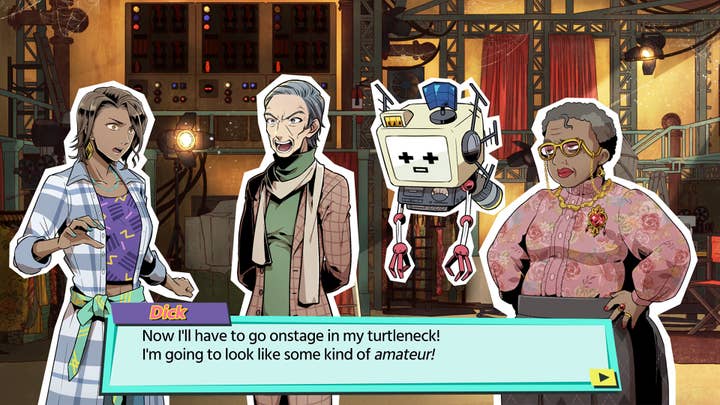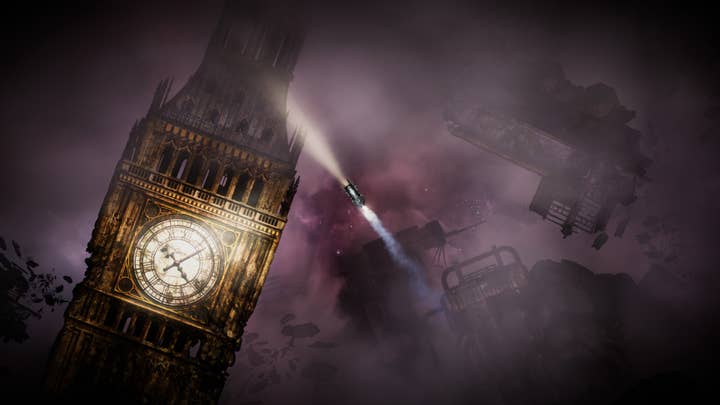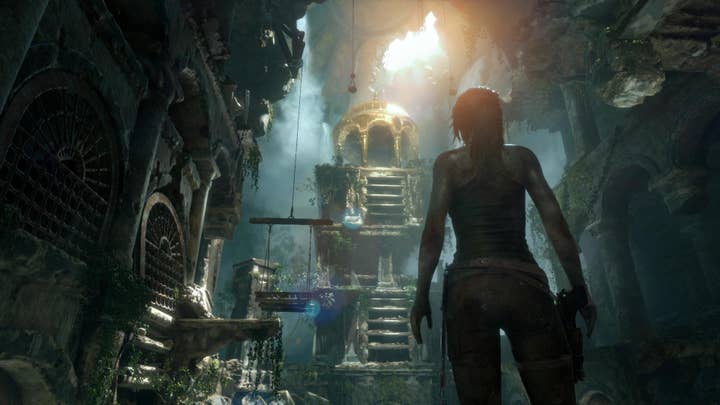A brief guide to writing for video games
Our EGX Rezzed Digital panel discusses the different aspects of being a writer in the games industry
A lot of people learn scriptwriting, try things out on Twine, or major in English in the hope to become, one day, a games writer. There is no straight path to games writing and very few courses solely dedicated to this part of the industry.
GamesIndustry.biz UK editor James Batchelor hosted an EGX Rezzed Digital panel discussing the topic. It featured freelance scriptwriter and narrative designer Rhianna Pratchett, known for penning the recent Tomb Raider entries, Inkle co-founder Jon Ingold, who created a brand new language for Heaven's Vault, Mediatonic's senior creative designer Ed Fear, who recently directed Murder by Numbers, and Failbetter Games' writer, narrative designer and editor Olivia Wood.
How do you get a job as a games writer?
The panellists all had different paths into the industry, illustrating the many possible options when trying to become a games writer. Rhianna Pratchett and Ed Fear both came from a journalism background.
"I never set out to be a video games writer," Pratchett said. "[I worked] at PC Zone and Larian contacted me because they were looking for a native English speaker to polish up their script for Beyond Divinity.
"I [then] literally went to companies whose games I liked and said: 'Hey, I'm doing this now, do you have any work for me?' I did everything I could to get a little bit of experience, a little bit of credit, and that worked really well."
Fear explained that journalism is a good way to train as a writer, because it forces you to write regularly and consistently.
"I knew I wanted to make games, I knew I also wanted to write, and I ended up getting a job at Develop magazine," he said. "Magazine writing is a good way of [writing at a regular cadence]. I thought it might help me become more productive, and silence my inner critic."

After doing that for a couple of years, he joined publisher Curve Digital as a production technician -- nothing to do with writing then, but a great way to get a foot in the industry and "weasel [his] way into writing," he said.
Starting in a role that doesn't reflect what you actually want to do is a common way into games, with QA and game testing often at the forefront of this. But writing as a hobby can lead to career opportunities as well -- a path that mimics Olivia Wood and Jon Ingold's approach.
"I was in a job as an editor [when] I started writing a game called Lethophobia with a friend I made on Twitter," Wood said. "And it was using Failbetter's StoryNexus system."
“No one would pay me to write for games, so I was forced to set up my own company”Jon Ingold, Inkle
This started a conversation with Failbetter, which then hired her as a freelance editor. From there, she made her way into a writing position. Ingold started his career by making text adventure games in the '00s with what he called a "community of hackers and artists" -- this is also how Sam Barlow and Emily Short started. From there, he was hired at Sony Cambridge as a level designer, where he didn't do any writing work, but met Joe Humfrey, with whom he ended up creating Inkle.
"We set up Inkle together so we could do the kind of games that we actually wanted to do," he added. "Until I set up my own company, no one would pay me to write for games, so I was forced to set up my own company."
What are the different writing jobs in the games industry?
"Games writer" can imply many different things, and it's not the only writing work available in the industry. Narrative designer is also a common position, though its meaning varies vastly from company to company.
"One of the problems is no one knows what a narrative design actually is," Wood said. "At Failbetter you cannot write without being a narrative designer, just because of the way our stories are told. In other companies, the narrative design might be handled entirely separately from the person who sits down and writes. So it's a very weird title, that if you see a job application for, you have to read what they're asking for rather than the title."

Pratchett added: "If you think about writers as doing the traditional story bits, largely governing script, character, plot, and development, narrative designers are more concerned with the ways in which the story is told, the way the story is communicated to the player. So they have one foot in the camp of writing and one foot in the camp of design. That's how it broadly falls."
Then there's specialties within these positions -- not all writers just sit down and write the main story of the game.
"Level dialogue [is] the moment to moment narrative that you might have, for example Lara [Croft] talking to herself during a level," Pratchett said. "Bark is the short lines of dialogue that come from usually AI, sometimes party members, and they're just really telling you about what's going on in the world around you, maybe what's going on in a fight."
Ingold warned panel viewers that being a games writer involves less writing than you imagine -- don't go into the job thinking that your words will be the star of the show.
"It's really rare to be allowed to do any words, and not just be squeezing things into boxes"Jon Ingold, Inkle
"There isn't really that much writing actually going on, because everything is so distributed and integrated with everything else," he said. "If you work on a big game, somebody really very important gets to design the major story beats and what the characters are about, because all of that is so tied up with what the game fundamentally is.
"And then right down at the bottom are people filling in the lore book entries -- quite remote contractors who don't necessarily get very much input into the game at all.
"In the middle, there's this huge spectrum ranging from people who write cutscenes to people who integrate the bark with the level. Writing and storytelling pop in all over the place and in all different aspects, and everyone gets a handle on it somewhere. Even the programmers designing the interface for the level designers have an impact on how that story is told -- they wouldn't think of themselves as writers, but ultimately they're fundamentally how the narrative comes out.
"It's actually really rare and very precious to be allowed to be able to do any words at all, and not just be squeezing things into boxes that are a funny shape."
How much creative freedom is there as a games writer?
If you're lucky enough to actually write words as your job, that doesn't mean you will be writing the words you want either. Your creative freedom will, once again, vary vastly depending on the job.
"The game designer makes spaces, and then the writers come in and fill in those spaces," Ingold said. "Sometimes those spaces are very straightforward, and sometimes they're very complicated, but it totally depends on the size of the company and the complexity of the thing that you're working on."

Wood added: "At an indie [developer] you're probably going to have a lot more input, but you'll also be doing a lot more jobs. While Chris [Gardiner, head writer at Failbetter] does the whole overview of where Sunless Skies [is] going, you discuss the plot you're writing and then go away and write it. Within that plot, you'd have immense freedom, as long as you aren't doing anything that conflicts with the lore or the style. So there are pockets of complete freedom. I don't think you'd get that at a larger company, unless you're very senior."
In AAA, having your say in the story is not as simple as it is in indie development, especially for established franchises. But you may be able to impact the lore in other ways than via the main plot.
"There's no way you're going to give Lara Croft a sibling who gets to run around in the game, unless you own the whole franchise," Ingold said. "But maybe you can have Lara write a letter in which you casually mention that she has a sibling and then hide [it] on a shelf somewhere -- you might even get away with that. It's all political: the fewer people between you and getting your story idea out, the more likely you are to have control over it."
"Writers live around the edges. You get to sneak in little bits of you through the secondary narrative"Rhianna Pratchett
Pratchett worked on the bark system for Bioshock Infinite, and explained that secondary narratives are usually a good way for the writer to show their personality.
"I didn't have anything to do with the main storyline," she explained. "I had my own little space and I was doing my own thing. It may seem like they're not the sexy part of the game, not like the shiny cinematics, [but] it can be a lot of fun and you can get a lot of jobs supporting other writers doing that kind of thing.
"In games, writers live around the edges. So you get to sneak in little bits that feel more you through the secondary narrative. I did a little bit with Rise the Tomb Raider [too]. I put a story about my dad's experiences on the night I was born. I sort of rolled that into Lara's dad and that was quite a nice thing to do."
What are the advantages of being an in-house writer versus a freelance writer?
Like a lot of jobs in the industry, games writing can be done in-house at a studio or as a remote freelancer. Both have advantages and downsides, and one may be better for you depending on what kind of person you are and how you like to work.
"I found that I like working in a team, very full-on, but the problem with that is that it becomes all encompassing," Fear said. "When I work on a project [in a team], I'm working on that project and only that project for two years. And it becomes kind of my everything and that can take a toll on you a little bit.

"In the periods where I have done freelance, I've enjoyed being able to work on multiple things at the same time. They can act as a refresher, if you're doing a different role or if the game is a different genre. [But] I felt a little bit less attachment to them, because there was a slight distance. So it's very much a double-edged sword."
Wood currently does both in-house writing at Failbetter, and freelance jobs on the side.
"Unless you're incredibly disciplined, freelance on its own could be very hard"Olivia Wood, Failbetter
"While I love the security of Failbetter, freelance keeps me sane because I get to work on more than one thing," she said. "But there is a risk that you can become quite lonely when you freelance [full-time]. I should also flag that being permanent is really, really relaxing because you get sick pay and you get holidays, which you don't as a freelancer.
"When I was purely a freelancer I went a little bit mad because I would just work for months on end, even on weekends. So unless you're incredibly disciplined, freelance on its own could be very hard."
Advice for aspiring game writers
Downloading Twine, or Inkle's own scriptwriting system Ink, can be a good place to start for aspiring games writers. Getting a narrative degree or doing a writing course is not mandatory, as it ultimately doesn't say whether or not you're a good writer. Wood said she prefers seeing short finished games attached to applications rather than what school you've been to.
"Finished, because finishing is the hardest thing you can ever do, and short because if I'm looking at things at my lunch and I can see whether someone is interesting in five to ten minutes, I'm happy to commit," she explained. "If it's eight hours, I'm gonna play a different game. I don't have time. And it also shows you can do a build up and a good ending in a short piece."
Don't forget to post your projects online, on Itch.io for instance, or just publicise them using platforms like Twitter. Entering competitions like IFComp, dedicated to "text-driven digital games", is also a good idea. Pratchett added that you need to be constantly improving your skills as a writer.
"Whether that's doing courses or just your own experimental writing, find a peer group to give feedback, just keep writing and honing your skills as a writer," she said. "[Then it's about] networking. Obviously it's not a great time for networking at the moment, but in a normal world, [attend] conferences like GDC, Reboot, Nordic Game. They usually have some kind of narrative component to them, and show floors where you can actually meet developers face-to-face and see the game they're working on.
"And [then it's also about] just playing a lot of games and broadening out [your scope]. Read books, go to the theater, listen to the radio, watch TV, watch movies -- don't just make games your source of understanding of the narrative world. You need to broaden your narrative scope to all kinds of storytelling, because they all have their own unique skills, and they can all be borrowed and adapted for games. You just need to be interested in the world as a writer, you need to be open-minded, you need to be a sponge for stories and for people."
You can rewatch this panel about becoming a games writer below. To catch up with everything GamesIndustry.biz did at EGX Rezzed Digital, head over to the event's website.

